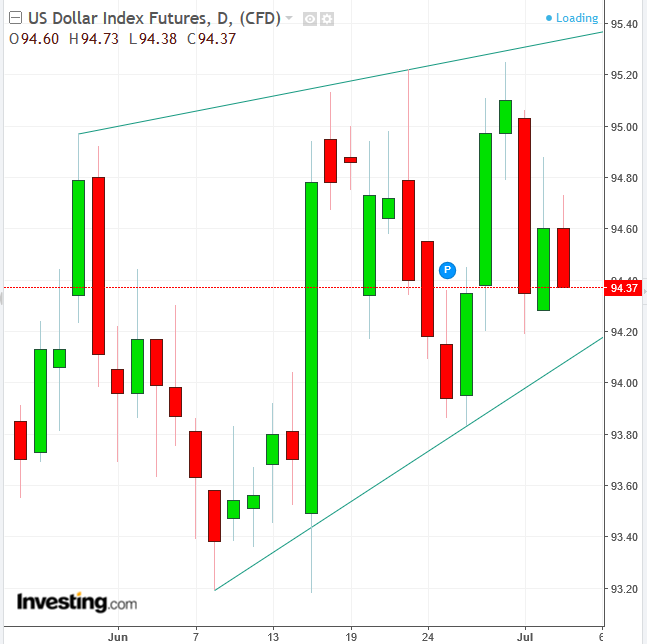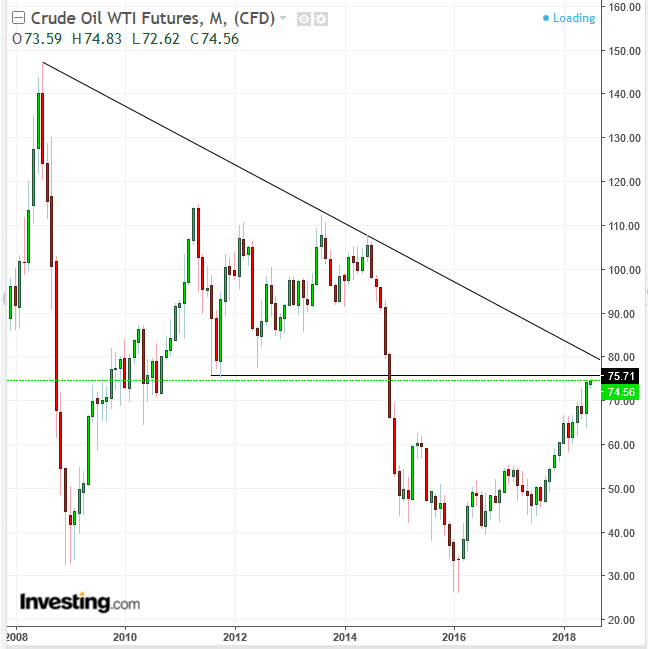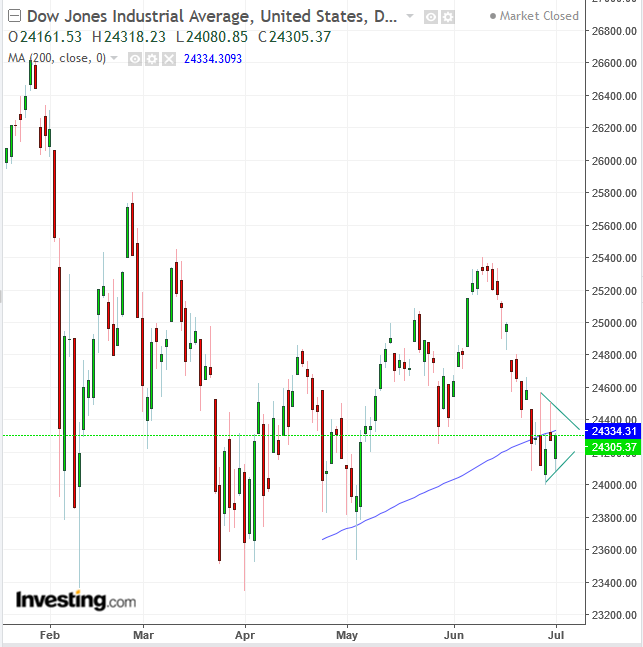-
European shares, US futures channel upward global momentum
-
Asian indices rebound after state media warns against trade jitter-fueled panic selling
-
Yuan's steep plunge trimmed after PBOC signals currency intervention
-
Euro rebounds on Germany's coalition government deal
-
Dollar slips lower even against rising US yields
-
WTI nears $75 after Saudi supply increase fails to rebalance oil market
-
US majors bounce back as traders shrug off trade anxieties, but worrisome technical patterns develop
-
The US celebrates Independence Day on Wednesday, July 4. Stock and bond markets are closed, along with government offices.
-
The Federal Reserve releases minutes of its June 12-13 meeting on Thursday, when policy makers raised the benchmark rate a quarter point for the second time this year and lifted the median forecast to four total increases in 2018.
-
US payrolls are due on Friday.
-
Also on Friday, the US is scheduled to impose tariffs on $34 billion of Chinese goods. Beijing has said it will slap import taxes on an equivalent-value amount of US exports, including agricultural and auto products.
-
The STOXX Europe 600 increased 0.4 percent.
-
Futures on the S&P 500 advanced 0.2 percent to the highest level in more than a week.
-
The MSCI All-Country World Index gained 0.1 percent.
-
The MSCI Emerging Market Index slipped 0.4 percent.
-
The Dollar Index Futures dropped 0.24 percent.
-
The euro advanced 0.1 percent to $1.1654.
-
The British pound gained 0.1 percent to $1.3158.
-
The offshore yuan lost 0.2 percent to 6.69 per dollar, reaching the weakest level in almost 11 months on its 14th straight decline.
-
The yield on 10-year Treasuries slipped less than one basis point to 2.87 percent.
-
Germany's 10-year yield gained one basis point to 0.32 percent, the most significant gain in a week.
-
Britain’s 10-year yield climbed two basis points to 1.275 percent, the biggest rise in more than a week.
-
The Bloomberg Commodity Index advanced 0.4 percent.
-
West Texas Intermediate crude climbed 1.1 percent to $74.79 a barrel, the highest level in more than three years.
-
LME copper climbed 0.8 percent to $6,576.00 per metric ton, the most substantial increase in almost four weeks.
-
Gold gained 0.1 percent to $1,243.39 an ounce.
Key Events
European indices and US futures on the S&P 500, Dow and NASDAQ 100 rallied in Tuesday's early trade, pushing global shares higher after a mixed and volatile Asian session that was dominated by a jittery yuan.
Germany’s coalition government managed to avert a full-fledged breakup over the country's migrant policies, helping both the euro and the pan-European STOXX 600 to recover.
The continental benchmark index lost three quarters of its 0.6 percent gains from Monday in the first 45 minutes of today's trading, trimming yesterday's advance to 0.15 percent as the index traded at the bottom of the session. However, it rebounded higher by 0.68 percent at the time of writing. US futures also lost steam but bounced back shortly after.
Earlier, during the Asian session, People’s Bank of China Governor Yi Gang helped the sinking yuan, saying the bank aims to keep the country's currency at equilibrium and is keeping its recent devaluation under close look.
The renminbi lost 5 percent over 10 declining sessions out of 12, but recouped 0.5 percent of those losses after Yi Gang's statements.Technically, it settled precisely at the September 207 peak.
Japan’s TOPIX reversed a 0.75 percent loss into a more manageable 0.15 percent slide—providing investors some reassurance after the 2 percent fall it posted on Monday.
However it was China's Shanghai Composite that exhibited the most impressive rebound in the region, turning a 1.9 percent plunge into a 0.4 percent advance. The benchmark jumped concurrently with the yuan amid signs of monetary policy intervention, but its reversal was also bolstered by the country's state media, which called the recent sell-off in mainland stock markets an "irrational overreaction" and urged investors to not magnify the ongoing trade tensions between China and the US.
Hong Kong's Hang Seng underperformed, closing 1.3 percent in the red—though it trimmed a much steeper 3.25 percent plunge. Technically, the sharp rebound formed a mighty hammer above the 28,000 key support/resistance level since August 2017.
South Korea’s KOSPI bounced back from a 0.8 percent setback to eke out gains of less than 0.05 percent. Australia’s S&P/ASX 200 outperformed again, climbing 0.5 percent. Technically, the Aussie index is in the making of a bullish pennant, whose upside breakout would fall below 6,180.

Dollar futures fell even against a rising US yields. Technically, the price is retesting the bottom of a rising channel since June 8. However, as the highs and lows converge, the channel may turn into a bearish, rising wedge, complete with a downside breakout, below the 94.00 level.

West Texas Intermediate crude climbed for the fifth time in six sessions, hitting the key $75 level for the first time since November 2014, after the production increase signaled by Saudi Arabian officials failed to move the needle on global supply. Technically, the price is heading to a macro downtrend line since mid-2008, under the $80 level, as well as the resistance above the $75 level, prior support since 2011, till its violation at 2014.
Global Financial Affairs
Today's mixed equity performance follows yesterday's volatile US session which saw most stocks rally.
The S&P 500 bounced back from losses of 0.65 percent, closing 0.31 percent higher. Gains of 0.89 percent in Technology shares offset a plunge of 1.51 percent in Energy stocks.
The Dow Jones Industrial Average climbed 0.15, coming back from a 0.75 percent drop. The NASDAQ Composite enjoyed the strongest rebound, crawling back from being 0.82 percent in negative territory to 0.7 percent in the green. As well, the Russell 2000 turned a 0.66 percent retreat to a 0.7 percent advance.
This dramatic US equity rebound may underpin investor resilience ahead of a thorny trade tariff deadline on Friday. US President Donald Trump is poised to press ahead with $34 billion-worth of levies against Chinese products, thereby prompting Beijing to retaliate in equal measure.
News reports on Monday, that Trump's administration is also preparing to withdraw from the World Trade Organization, will further test markets. Do traders have the ability to brush off Trump's isolationist moves as mere negotiating tactics?
While US majors remain in an uptrend since February's sharp selloff, they are all developing worrisome consolidations that are forming pennants. These patterns indicate that sellers and buyers are competing fiercely, but the advantage is toward the preceding move, which has been down. This suggests momentum is on the side of the sellers.

In particular, the Dow Jones sent out an especially alarming signal yesterday. Its rebound failed to overcome the 200 DMA. However, bearish pattern would only be complete after downside breakouts, so hope is not entirely lost.
Up Ahead
Market Moves
Stocks
Currencies
Bonds
Commodities
